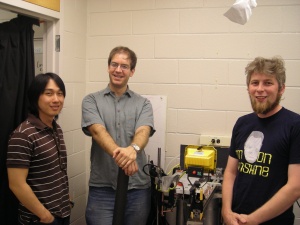Inverted pendulum-2010: Difference between revisions
(v) |
No edit summary |
||
| Line 1: | Line 1: | ||
'''Stabilizing an inverted pendulum''' | |||
''Group members: Yiwei Cheng, Samuel Shapero, M. Robert Hayward'' | |||
[[Media: | Main presentation]]. '''Papers:''' [[Media: Cheng_Invertedpend_.pdf | Yivei]], [[Media: hayward_pendulum.pdf | Robert]], [[Media: Shapero_InvertedPendulum_Final.pdf | Samuel]] | |||
This is a website dedicated to the Inverted Pendulum Project. The simulations and laboratory experiments conducted in the inverted perdulum project are part of the requirements of the class: Phys 4267A/6268 Nonlinear Dynamics & Chaos, Spring 2010. | This is a website dedicated to the Inverted Pendulum Project. The simulations and laboratory experiments conducted in the inverted perdulum project are part of the requirements of the class: Phys 4267A/6268 Nonlinear Dynamics & Chaos, Spring 2010. | ||
Revision as of 16:57, 21 September 2012
Stabilizing an inverted pendulum
Group members: Yiwei Cheng, Samuel Shapero, M. Robert Hayward
[[Media: | Main presentation]]. Papers: Yivei, Robert, Samuel
This is a website dedicated to the Inverted Pendulum Project. The simulations and laboratory experiments conducted in the inverted perdulum project are part of the requirements of the class: Phys 4267A/6268 Nonlinear Dynamics & Chaos, Spring 2010.
The overarching scientific objective of our research is to provide a coherent picture on stability and bifurcations of an inverted pendulum subjected to forcing that ranges from harmonic to nonharmonic in nature through a combination of numerical studies and laboratory experiments.

Group Member Bios
Samuel Shapero is a second year PhD student in the Bioengineering Interdisciplinary Program at Georgia Tech. His research focuses on implementing a sparsity extraction algorithm for high dimensional inputs using nonlinear analog circuits. He has a Master’s in Electrical Engineering from Stanford, and has a strong background in analog and digital filter analysis. His research advisor is Dr. Paul Hasler.
Robert Hayward is currently working on PhD in Nuclear and Radiological Engineering (expected Fall 2010). He has strong background in modeling and simulation, numerical analysis and data analysis. He has received his Bachelor’s in Cell and Molecular Biology and Bachelor’s in Mathematics from Tulane. He has received his Master’s in Medical Physics from Georgia Tech.
Yiwei Cheng is a third year PhD student in the School of Civil and Environmental Engineering. Yiwei’s main thesis advisor is Dr Marc Stieglitz and his research focuses on understanding how eco-hydrological processes scale. Specifically, whether there are emergent properties that manifest at scale resulting from small scale non-linearity and feedbacks. His research focus areas are in the Arctic and Everglades Florida, where he conducts field experiments and simulations. Yiwei has received his Bachelor’s and Master’s in Civil Engineering from Georgia Tech.